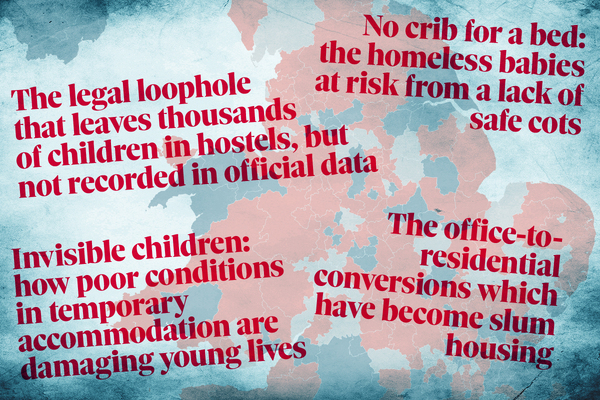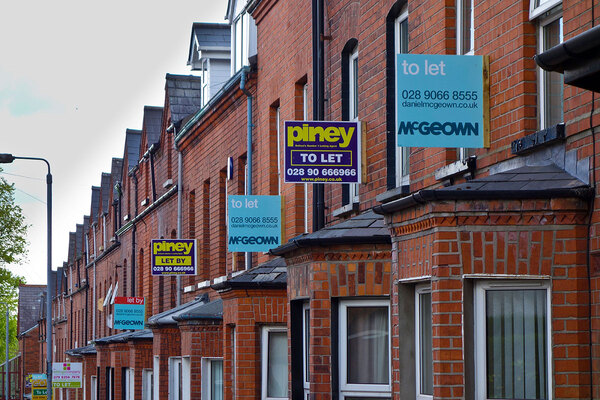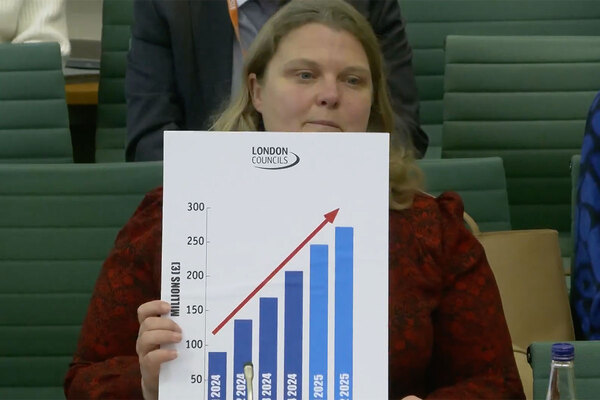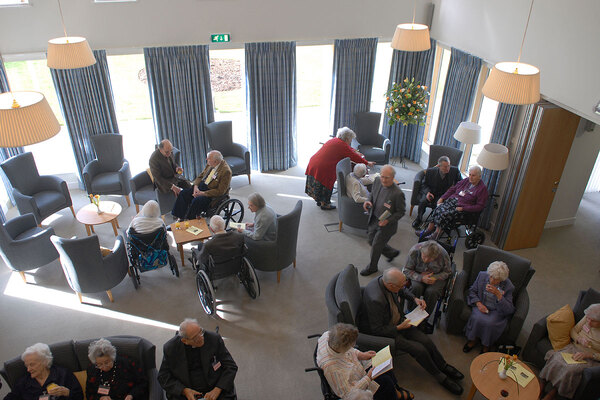The PAC report shows that the temporary accommodation scandal cannot be ignored
Jules Birch discusses the Public Accounts Committee’s report on the “unacceptable” numbers of homeless families
Think of all the elements of the grim inheritance bequeathed to this government by the last one and perhaps the grimmest is the almost 160,000 children living, and sometimes dying, in temporary accommodation.
Homelessness minister Rushanara Ali called it “an absolute scandal” in the Commons on Monday and “devastating” at a Housing, Communities and Local Government (HCLG) Committee hearing on Tuesday.
One committee member spoke of meeting a constituent before Christmas who had been in ‘temporary’ accommodation for 14 years, so the entire period of Conservative-led government between 2010 and 2024.
This morning a report from the Public Accounts Committee (PAC) calls it “unacceptable” and “alarming” that almost 6,000 homeless families with children are in bed and breakfast accommodation. The worst form of temporary accommodation is no longer the last resort the guidance says it should be. Of those, almost 4,000 have been in B&B beyond the increasingly theoretical six-week legal limit, a figure that is 23 times higher than in 2010.
It is a scandal that comes at a huge cost for local authorities: £3.1bn a year for homelessness services, including £2.1bn for temporary accommodation at the latest count.
All this should be enough on its own to condemn the Tory inheritance, but it is just part of a broader failure highlighted by the PAC. Where, for example, is the cross-government strategy on homelessness that the former government said would be implemented by July 2018?
What happened to an Affordable Homes Programme that was meant to produce 180,000 affordable homes but may generate as few as 110,000?
And where is the action to fill gaps in the regulation of supported housing and stop exploitation of residents by unscrupulous private landlords? The Supported Housing (Regulatory Oversight) Act became law in August 2023 but has still not been implemented.
But for all those damning questions about its grim inheritance, it is now time the Labour government that has been in power for six months came up with some answers.
“What happened to an Affordable Homes Programme that was meant to produce 180,000 affordable homes but may generate as few as 110,000?”
As the PAC points out, all of the UK devolved nations except England have an overarching strategy or action plan to end homelessness.
The devolved nations have their problems too, of course, but over the past 14 years England has become a country where temporary accommodation has become so institutionalised as to be almost permanent.
Meanwhile out-of-borough placements of homeless people have surged by 42% in the past five years to 39,000 in the year to June and have become normalised.
The deputy prime minister wrote to local authorities before Christmas reminding them that exporting homeless families miles away from friends and family, schools and work should be a last resort. Her department still has no data on how far away they are being sent.
Changing what has become institutionalised will require a strategy, commitment from the top of government and, above all, investment.
That may mean thinking creatively, for example by funding local authorities to buy back homes sold under the Right to Buy as well as building more homes.
But it can also draw on the example of the last Labour government, which successfully cut the use of B&B in the early 2000s.
The good news is that England now has an Inter-Ministerial Group on Homelessness and an Inter-Departmental Taskforce on Homelessness and Rough Sleeping.
That cross-government focus has already produced some results, such as an amendment to the Children’s Wellbeing and Schools Bill to disapply the intentional homelessness test for young care leavers, but the Inter-Ministerial Group only seems to have met once.
Alongside a long-term strategy on housing early this year, the government is promising a strategy on homelessness that Ms Ali told the HCLG Committee would be published “following the conclusion of phase two of the Spending Review”.
Let’s hope for positive results, but the cynic in me suspects that the strategy could be tailored to fit the resources available rather than the other way around.
“Standard ministerial lines about the Autumn Budget’s extra £233m for homelessness and £500m for affordable homes will only paper over the cracks”
What, for example, will the strategy make of the decision to freeze Local Housing Allowance (LHA) rates for next year? All the evidence suggests that repeated cuts and freezes in LHA under the last government were a significant contributor to homelessness and the scandal of children in temporary accommodation.
Ministers can point to the grim inheritance and the fiscal black hole the Conservatives left behind as justifications for taking a difficult decision, but freezing LHA again will have inevitable consequences. Doing so at a time when rents are rising at a record rate will only intensify the impact.
The decision was made by the Department for Work and Pensions (DWP) and the Treasury but the knock-on effects will be felt by the Ministry of Housing, Communities and Local Government (MHCLG) and local authorities.
The PAC comments dryly that: “We are concerned at the subjectivity of DWP’s judgements and that it cannot say what impact raising LHA rates would have on homelessness.”
In a similar vein, MHCLG is already taking action on everything from working with councils with the highest number of families in bed and breakfasts to incentivising prevention work to sharing best practice. All this may well improve outcomes.
However, standard ministerial lines about the Autumn Budget’s extra £233m for homelessness and £500m for affordable homes will only paper over the cracks.
I’m sure that all the arguments above, and better ones, are being made in private within government in the struggle to convince the Treasury that housing and homelessness should be a priority.
In public, we are in an artificial period where until the Spending Review is published, nothing can be said out loud about what everyone knows is the only long-term solution. Because the answer to the “absolute scandal” of 160,000 children in temporary accommodation can only be more permanent accommodation.
Jules Birch, columnist, Inside Housing
Sign up for our homelessness bulletin
Already have an account? Click here to manage your newsletters













